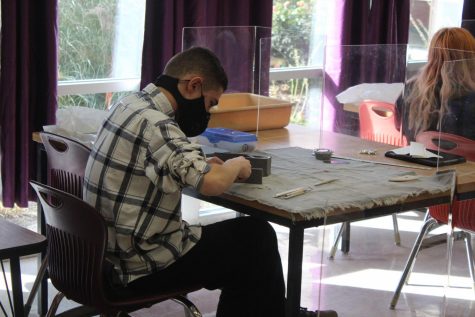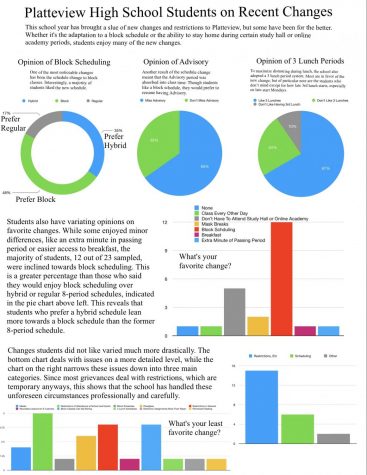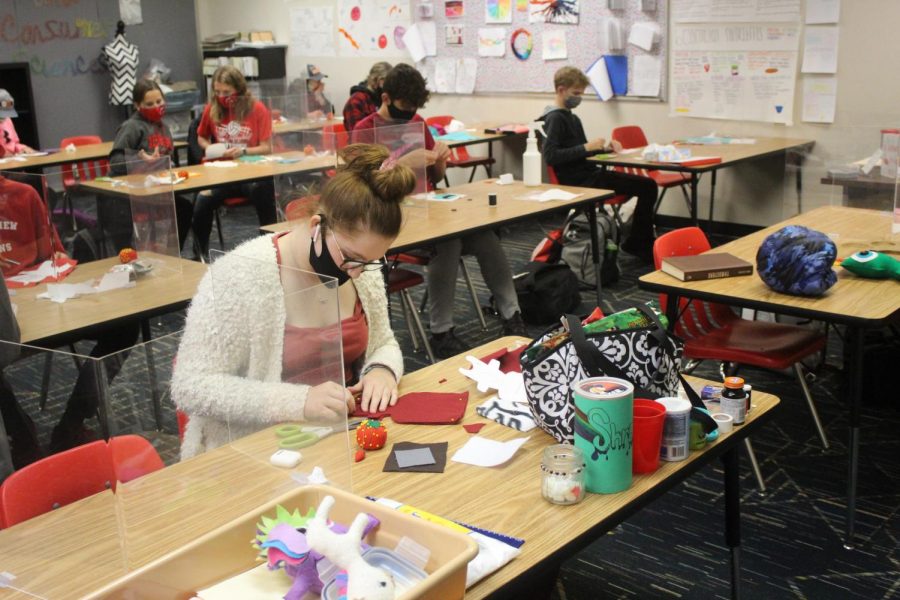Students Pleasantly Surprised by New Changes in 2020-2021
February 2, 2021
We have a whole semester of this new breed of schooling under our belts, now, so it’s time to look back and evaluate the pros and cons of recent changes. Some changes have only been to safeguard students and staff- like masks and plexiglass- while others could continue to be implemented in coming school years. These changes include block scheduling, the loss of the Advisory period, three lunch periods, and opting out of attending study hall or Online Academy classes that occur at the beginning or end of the day.

Perhaps the most prominent of these changes is the new block schedule. When block scheduling was first announced, teachers and students understood it to mean cramming two days’ worth of work into one day. At the beginning, that was essentially it. There was an almost distinct break in class time (aided by mask breaks or lunch), where teachers would shift the instruction to another topic, pass out a new assignment, or give students work time. But that has since changed and morphed.
As teachers adapted to the new schedule, classes became much more fluid. Most classes, it seems, have altered to a process as follows: lecture, mask break, work time. With more time, however, this can change. Projects and labs have made the most of extended work time. Other teachers have more time to explain or lecture, keeping their lessons smoother. With two days to complete homework assignments, students have more time to complete homework. Drawbacks exist, of course. Mainly, this means that missing a day of class has a greater impact and students can be prone to losing interest in an extended lecture. Overall, the opinion of block scheduling has been generally positive, and, with the administration’s proposal of a hybrid scheduling system, the different scheduling systems can be reconciled with each other.

Advisory was sacrificed this year to block scheduling and to limit interaction. Since its introduction, Advisory has had what might be considered a yearly existential crisis. One year it’s homework and relaxation time, another year it’s ACT prep, and another year it is reincarnated as a housekeeping/gaming period. Though its identity has been fluid, advisory has been missed by the student body. The “brain break” aspect of it is too alluring to simply abandon. Students enjoyed associating with peers on a more personal level and having a teacher help keep them up-to-date on grades and school issues. When schools eventually go mask-less, perhaps Advisory will come back, maybe taking on itself the tone and purpose of mask breaks.
Another change used to protect students and staff is the three lunch period system. The consensus on this seems quite clear- three lunch periods are great, unless you are without friends or stuck in third lunch. With less students in each lunch period, it was inevitable that students would be eating with less friends. It was an inexorable consequence. Fortunately, students can solve this problem by picking classes with their friends. What cannot be so readily ‘fixed’ is being left with third lunch. To students, it’s just too late in the day; however, most students consider it a price willing to pay for less noise, more seating options, and a shorter lunch line.
It would be difficult to find a student who wouldn’t approve of opting out of study hall or Online Academy. Leaving school early or coming to school late is the kind of arrangement that students are more than enthusiastic about. Night owl students take full advantage of sleeping in, while working or interning students are able to leave early to maximize their hours and earn more. No questions asked, this change would be sorely missed by students in later years if it was eliminated. 
Many things have changed this year, and though students want to reverse some, others they want to stick around. Block scheduling has pleasantly surprised students and staff with many of its benefits; three lunches have been welcome; and the ability to opt out of in-person study hall and online academy at the beginning and end of the school day has pleased many learners. On the other hand, Advisory has been missed. Hopefully, future school years will find a way to keep positive changes while bringing back time-honored traditions and some sense of “normalcy.”
